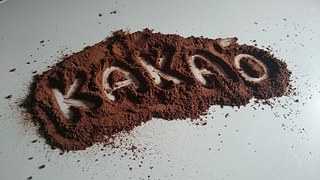
You know when something happens that’s such a coincidence, you can’t help but stop to marvel at it? And then blog about it? (Or is that just me?)
Last week I won a copy of The Chocolate Tasting Kit at a chocolate industry panel at the Smithsonian. The panel moderator, cookbook author Monica Bhide, offered to give a free copy of the book to the first person who could correctly answer the question, “what does theobroma cacao mean in Greek?” After some (gentle) elbow prodding from my husband, I raised my hand.
In unrelated news (or so I thought), the next day I was emailing a thank you note to the very kind author of this inspiring blog about chocolate. It’s the kind of blog I would love to create someday (maybe when I actually know what I’m doing). I’d emailed her a question and she’d responded right away, checked out my blog, and even offered me some great tempering advice. So helpful.
And then I noticed her email signature: “Eagranie Yuh. Author, The Chocolate Tasting Kit.”
Those who work in the chocolate world (chocolate makers, chocolatiers, competition judges, bloggers, authors, educators and shop owners) all seem to know each other. If you follow one of them on Twitter, it’s likely that person is following dozens, maybe even hundreds of other industry participants. Many of them are friends. They meet up at industry events and award shows, or they speak on panels like the one at the Smithsonian. They eat each other’s chocolate, and sometimes they even buy shipping containers of cocoa beans together. I remember being so surprised to learn that one of my favorite craft chocolate makers has been using the exact same Dominican cocoa beans as another well known chocolate maker because they had gone in on a shipping container of beans together.
It’s understandable that the American craft chocolate industry is so close-knit. It’s tiny: there are only a few dozen American craft chocolate makers, at most. And the hurdles for these small business owners can seem insurmountable. Equipment and certifications are expensive, chocolate is a temperamental, unpredictable product, and American consumers are still somewhat uncomfortable spending $10 for a chocolate bar. Most chocolate makers have no illusions about becoming rich making chocolate. Usually they’re in the business because they love it.
With so many obstacles to success, chocolate makers NEED each other. They need each other’s advice, inspiration and support. And they need the industry to be successful, as a whole. Which means they need their competitors to be successful. For this reason, they are a welcoming, transparent, hyper-communicative group of business owners. They praise each other’s successes and promote each other’s events. They give advice freely, even to newbies like me.

Emailing a Canadian blogger only to later discover she’s the author of a book I’d just won at a D.C. chocolate panel is exactly the kind of coincidence I should learn to expect in such a close-knit community. And yet, like so many other experiences I’ve had as I begin my chocolate education, I can’t help but feel like it’s some kind of cosmic cattle prod directing me deeper and deeper into this crazy passion (obsession?) of mine.
For the record, theobroma cacao is Greek for “food of the gods.”

Great post! So true! I’ve spent time researching the Canadian bean-to-bar market and have found such respect and sharing among chocolate makers. They really need to lean on each other. And don’t you just love Eagranie’s kit?
LikeLike
I do love the kit! I’m going to use it for my Ecole Chocolat chocolate tasting later this week. Thanks so much for the kind words. I LOVE your blog btw, it’s fantastic, I just followed it.
LikeLike